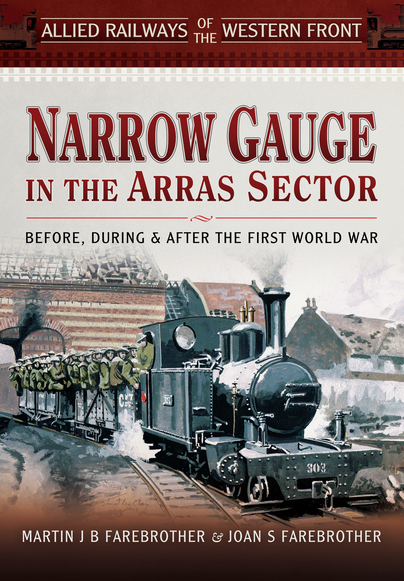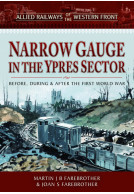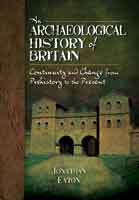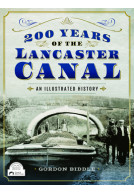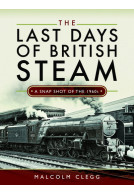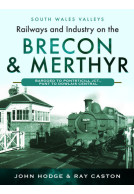Allied Railways of the Western Front - Narrow Gauge in the Arras Sector (Hardback)
Before, During and After the First World War
Imprint: Pen & Sword Transport
Pages: 296
Illustrations: Includes approx 200 photographs, 66 maps, plans and line diagrams, and 32 main tables
ISBN: 9781473821187
Published: 14th December 2015
(click here for international delivery rates)
Need a currency converter? Check XE.com for live rates
| Other formats available - Buy the Hardback and get the eBook for free! | Price |
|---|---|
| Allied Railways of the Western… ePub (198.3 MB) Add to Basket | £12.00 |
The Arras sector of the Western Front in World War I (WW1) was held partly by the British and Dominions 1st Army from September 1915, and almost wholly by the 1st and 3rd Armies from March 1916. No less than in the Ypres sector to the north and the Somme sector to the south, the struggles of the French and then British troops in this sector were pivotal to the outcome of the War. The sector included countryside in the south, but in the north a major part of the industrial and coal-mining area of northern France, around Lens and Béthune.
In this book the contribution of metre and 60 cm gauge railways to the Allied war effort in this sector is examined in the context of the history of the metre gauge lines already established. The build up of light (60 cm gauge) lines from 1916 is examined in detail area by area, and the contribution of the related metre gauge lines is reassessed, from British and French sources. After the War the role of these railways in the reconstruction and recovery of this devastated region of France is described. Later the surviving part of the 60 cm gauge network served the sugar beet industry east of Arras. The history is followed through another World War to the closure of the last of these railways in 1957.
The book refers to previous works on British War Department light railways in WW1, but contains sufficient general information for readers new to the subject. It also describes how to find key locations now, and how and where rolling stock can be seen. Six walks and an urban tour are included for those who wish to explore the territory in greater depth.
"Although it could be concluded that this is a work by railway enthusiasts for railway enthusiasts this would be understating the quality and overall usefulness of this superlative work which offer much to all with an interest in WW1 and logistics and supply. Very highly recommended and I look forward to reviewing the other volumes!"
Martin Willoughby, The Wessex Branch of the Western Front Association
Very well researched and written work. Interesting read, you learn something every time the book is picked up, well done.
Amazon Customer
5 Stars!
As featured in
Voie Etroite (volume 272), March 2016
An excellent idea to put the well-known wartime railway usage into a wider context. The result is a most interesting read, with ample inspiration for modellers.
Continental Modeller, July 2016
The authors have plainly researched their subject diligently and the resultant book is packed full of facts. They have clearly become completely at ease with the geography of the area they are writing about and, though they have done their best with maps and descriptions, your reviewer, not quite so familiar with the details, found it useful to have a reasonably large scale map of northern France to hand as he began reading...
Ffestiniog Railway Heritage Journal – Adrian Gray
... The Farebrothers have been well served by their publisher whose production values are high and they have presented a great deal of information in a manner that is readable but requires close attention.
The book's subtitle, Allied Railways of the Western Front, clearly intended to serve additionally as the title of a series to which this book will belong, and the promise of a complementary volume on the Somme sector, already in progress, indicate that this volume is the beginning of a massive undertaking.
Philip Pacey - Narrow Gauge News 333 - March 2016
The Farebrothers have researched their subject widely and in depth, in France and in England, in archives and on the ground. The result, so far, is this large format, hard bound volume, packed full of information, produced to the highest standards, including some 200 photographs and many maps and diagrams, most drawn especially for this book.
It is not often that books on trains in the Great War are published, or indeed that I read them, but Martin J.B. & Joan S. Fairbrother’s Narrow Gauge In The Arras Sector is an excellent addition to our knowledge of the war at Arras. The Great War not just about bullets and bayonets, it was a war where the winner was the one who master logistics and the British use of trains was all part of the Allied Victory in 1918. The book looks in detail at the railway structure pre-1914 and then how it was expanded and adapted during the war. It is profusely illustrated with many rare images. The numerous excellent network maps show how extensive the use was by 1918. A fascinating ‘Things To See and Do Now’ chapter is also included which helps the battlefield visitor find some most unusual sites, not normally considered. A most unusual and superbly researched book for both the railway and Great War buff.
WW1 Centenary - Paul Reed
For anyone with a serious interest in French narrow-gauge railways in general, and the light railways of the First World War in particular, this comprehensive and thoroughly researched book is a must-have and will amply reward the time taken to read it thoroughly.
SNCF Society Journal No.161
Very highly recommended.
The Somme sector of the Western Front was held by French forces until early 1916, when the British and Dominions Third and Fourth Armies moved into the northern part, before the joint First Battle of the Somme from July to November 1916. In 1917, with the German withdrawal to the Hindenburg Line, British responsibility moved further south. By early 1918 the British Third and Fifth Armies were responsible as far south as east of Noyon. In Spring 1918 the German attack and advance from the Hindenburg Line came west almost to Amiens. However the British and French Armies finally stopped the advance,…
By Joan S. Farebrother, Martin J. B. FarebrotherClick here to buy both titles for £70.00







